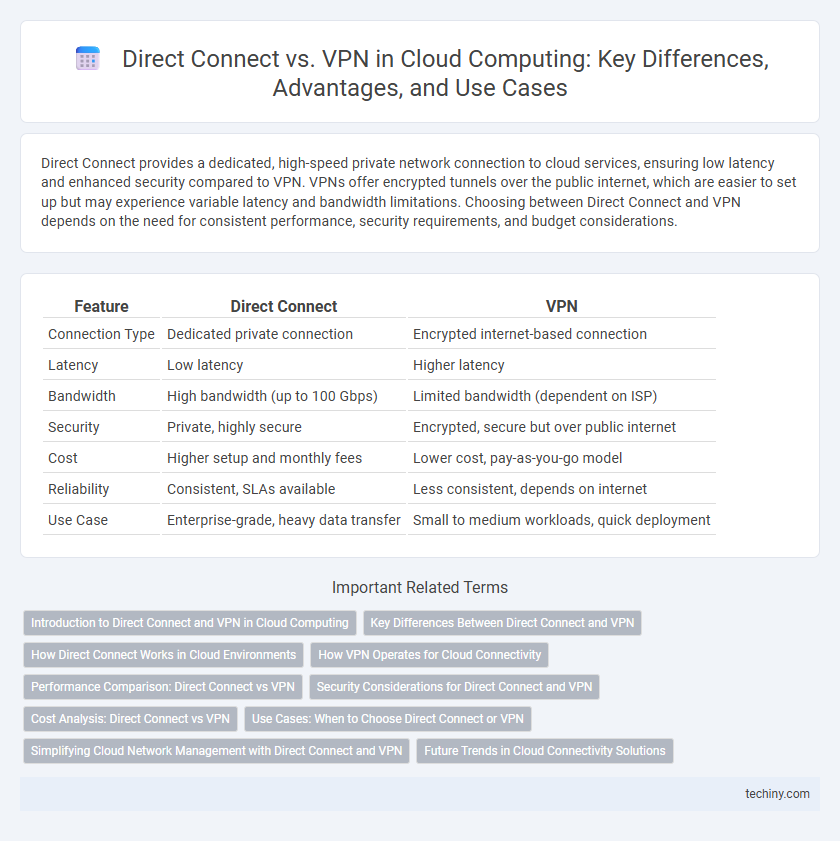Direct Connect provides a dedicated, high-speed private network connection to cloud services, ensuring low latency and enhanced security compared to VPN. VPNs offer encrypted tunnels over the public internet, which are easier to set up but may experience variable latency and bandwidth limitations. Choosing between Direct Connect and VPN depends on the need for consistent performance, security requirements, and budget considerations.
Table of Comparison
| Feature | Direct Connect | VPN |
|---|---|---|
| Connection Type | Dedicated private connection | Encrypted internet-based connection |
| Latency | Low latency | Higher latency |
| Bandwidth | High bandwidth (up to 100 Gbps) | Limited bandwidth (dependent on ISP) |
| Security | Private, highly secure | Encrypted, secure but over public internet |
| Cost | Higher setup and monthly fees | Lower cost, pay-as-you-go model |
| Reliability | Consistent, SLAs available | Less consistent, depends on internet |
| Use Case | Enterprise-grade, heavy data transfer | Small to medium workloads, quick deployment |
Introduction to Direct Connect and VPN in Cloud Computing
Direct Connect provides a dedicated, private network connection between an on-premises data center and a cloud provider, offering higher bandwidth and lower latency compared to traditional internet connections. VPN in cloud computing establishes an encrypted tunnel over the public internet to securely connect remote networks or users to cloud resources, prioritizing ease of setup and flexibility. Both technologies enable secure cloud access, but Direct Connect is optimized for consistent performance and large data transfers, while VPN supports quick deployment and cost-effectiveness.
Key Differences Between Direct Connect and VPN
Direct Connect provides a dedicated, private network connection to cloud services, offering lower latency and more consistent performance compared to VPN, which runs over the public internet. While VPNs use encryption to secure data transfers, Direct Connect ensures higher bandwidth and increased security by avoiding internet exposure. Cost structures differ significantly, with Direct Connect requiring a fixed monthly charge and VPN typically incurring variable costs based on internet usage.
How Direct Connect Works in Cloud Environments
Direct Connect establishes a dedicated, private network connection from an on-premises data center to a cloud provider's infrastructure, bypassing the public internet to offer lower latency and enhanced security. It uses standard Ethernet fiber connections to link with cloud resources, enabling consistent, high-bandwidth throughput crucial for data-intensive applications. By integrating with cloud Virtual Private Clouds (VPCs), Direct Connect supports seamless hybrid cloud architectures with improved reliability compared to typical VPN tunnels.
How VPN Operates for Cloud Connectivity
VPN for cloud connectivity operates by establishing a secure, encrypted tunnel over the public internet, enabling encrypted data transmission between on-premises networks and cloud environments. It relies on protocols such as IPsec or SSL/TLS to ensure confidentiality, integrity, and authentication, making it suitable for secure remote access and hybrid cloud scenarios. VPNs offer flexible deployment without dedicated infrastructure but may experience variable latency and throughput due to reliance on the public internet.
Performance Comparison: Direct Connect vs VPN
Direct Connect offers a dedicated, private network connection that significantly reduces latency and increases bandwidth compared to VPN, which relies on public internet routes. The stable and consistent throughput of Direct Connect ensures superior performance for high-demand applications and large data transfers, whereas VPN performance can fluctuate due to internet congestion and encryption overhead. Enterprises requiring reliable, predictable network speeds generally benefit more from Direct Connect's enhanced performance characteristics.
Security Considerations for Direct Connect and VPN
Direct Connect offers a dedicated, private network connection that significantly reduces exposure to the public internet, enhancing security by minimizing external threats and potential interception. VPNs rely on encrypted tunnels over the public internet, which provide robust security but remain vulnerable to risks associated with internet traffic, such as DDoS attacks and latency-related data exposure. Both solutions implement strong encryption and authentication protocols, yet Direct Connect's physical isolation often results in lower risk of data breaches and more consistent compliance with stringent regulatory requirements.
Cost Analysis: Direct Connect vs VPN
Direct Connect typically involves higher upfront costs due to dedicated infrastructure but offers lower long-term expenses and predictable billing compared to VPN services. VPN solutions generally have lower initial setup costs and utilize existing internet connections, resulting in variable monthly expenses influenced by data usage and bandwidth. Analyzing total cost of ownership reveals Direct Connect as more cost-effective for consistent, high-volume data transfers, while VPN suits intermittent or low-bandwidth needs.
Use Cases: When to Choose Direct Connect or VPN
Direct Connect is ideal for enterprises requiring consistent, low-latency, high-bandwidth connectivity for mission-critical applications and large data transfers between on-premises data centers and cloud environments. VPNs offer flexible, cost-effective solutions for secure remote access, smaller data volumes, or temporary cloud connectivity without the need for dedicated infrastructure. Choose Direct Connect for workloads demanding stable performance and predictable network experience, while VPN suits scenarios needing quick deployment, remote workforce access, or intermittent cloud usage.
Simplifying Cloud Network Management with Direct Connect and VPN
Direct Connect enables simplified cloud network management by providing a dedicated, high-bandwidth connection that reduces latency and increases reliability compared to traditional VPNs. VPNs offer encrypted, flexible connectivity over the public internet, making them easy to deploy but often subject to variable performance and security concerns. Combining Direct Connect with VPN allows organizations to optimize network performance while maintaining secure, scalable cloud access.
Future Trends in Cloud Connectivity Solutions
Future trends in cloud connectivity solutions emphasize increased adoption of hybrid models combining AWS Direct Connect and VPN to balance high bandwidth with flexible, encrypted access. Emerging technologies like software-defined WAN (SD-WAN) enhance dynamic routing and cost efficiency between on-premises environments and cloud platforms. Advances in edge computing and 5G integration drive lower latency and improved performance for Direct Connect links, while VPN solutions evolve with stronger security protocols and automation features.
Direct Connect vs VPN Infographic

 techiny.com
techiny.com